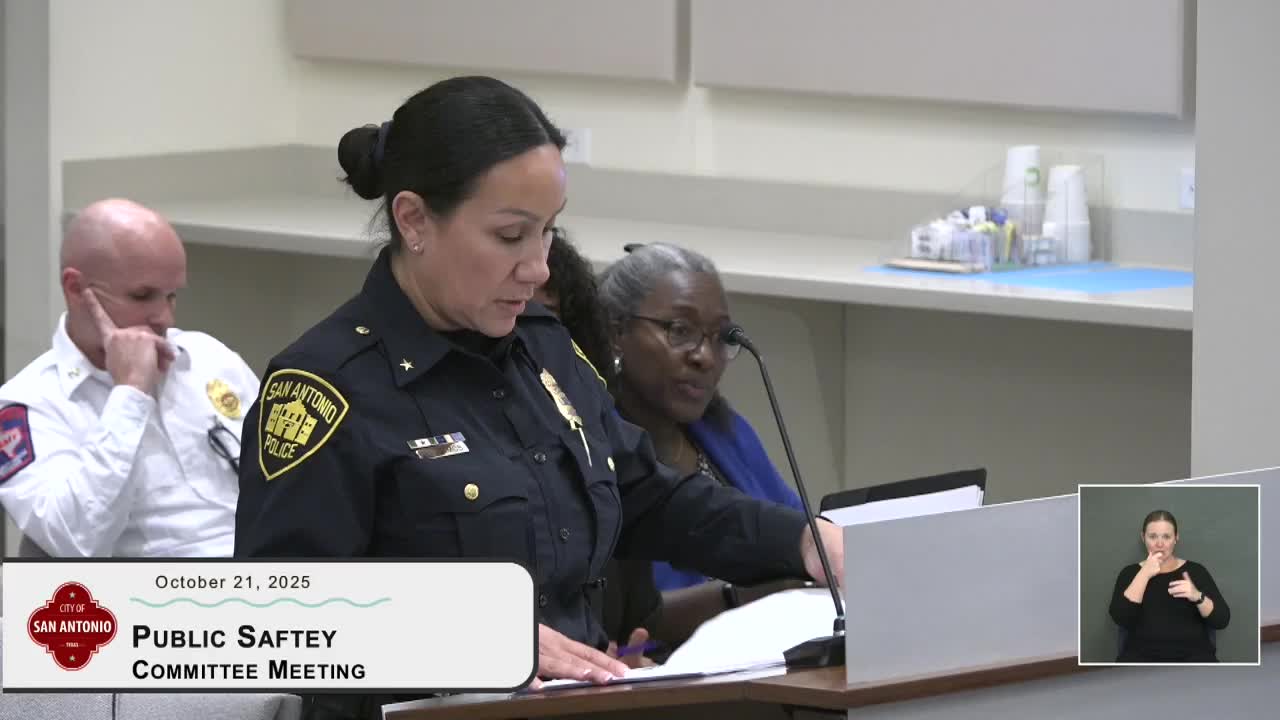San Antonio committee unveils citywide campaign to curb mailbox and communal-mail theft
Get AI-powered insights, summaries, and transcripts
Subscribe
Summary
City staff and police presented a multiagency prevention and public-education campaign after the police department reported rising group mailbox thefts; no formal action was taken at the committee meeting.
San Antonio officials presented a multiagency public-education and prevention campaign aimed at curbing a recent rise in thefts from group mailboxes and communal mail clusters.
The presentation, introduced by Councilmember Gabito and delivered by Assistant Chief Michelle Ramos of the San Antonio Police Department and Lana Ruiz from the city’s communications team, summarized historical incident data, proposed targeted prevention measures and outlined a public-information push in English and Spanish. Ramos summarized the legal framework local police will use in enforcement, citing penal code section 31.20 and recent federal changes to mail-theft penalties.
Ramos told the committee the department compiled three years of incident data and mapped hotspots. She said the department’s records show a large increase in reported incidents and that thefts affecting 30 or more addresses also rose: “...en 2023 teníamos 70; en 2024 fueron 126,” she said. Ramos reported arrests remain relatively low: “en 2025 7 arrestos” for incidents affecting fewer than 10 addresses and “6” arrests for incidents affecting 30 or more addresses to date. She characterized investigatory challenges as limited physical evidence, lack of clear vehicle descriptions, and underreporting.
Lana Ruiz, who is leading the outreach campaign, said the city’s objectives are threefold: increase awareness, teach simple neighborhood prevention strategies and clarify how residents should report suspected thefts. Ruiz summarized planned materials and channels: flyers and posters in libraries and community centers, a bilingual public-service announcement and an online hub on the City of San Antonio website. Ruiz said the campaign will help residents know “exactamente cómo reportar los hechos” and urged daily retrieval of mail and reporting of suspicious activity. Ruiz also said, in Spanish, “Este, una correo seguro es una comunidad segura.”
The police and partner agencies — including the U.S. Postal Service inspection service, the city’s utility (CPS), code enforcement and property-management stakeholders — described a mix of responses: targeted enforcement at mapped hotspots, technical prevention such as lock replacement and improved illumination, and community-focused measures, including training for neighborhood associations. The presentation noted CPS’s street-lighting program as an option for neighborhoods; speakers said installation costs and ongoing monthly charges are tied to meter ownership and may be shared by associations or property owners.
Presenters emphasized the campaign is educational rather than regulatory in this phase. Councilmembers asked about program costs, whether solar lighting was an option, what evidence police need for investigations (video, license-plate information, photographs) and whether the Postal Service can provide more direct outreach to postal employees; presenters said some of those details would be followed up by staff. The presentation concluded with staff saying the police and neighborhood-engagement teams will launch the campaign in coordination with the Postal Inspection Service and train code and safe officers to provide information to neighborhood associations.
No committee action was required or taken on the item at the meeting; presenters described next steps and committed to follow-up reporting on campaign launch and metrics.
The presentation combined enforcement, environmental measures (lighting, signage and cameras) and an education campaign with bilingual materials; staff said they will measure success through reported incidents, arrests, site visits to the campaign web page and media impressions.
